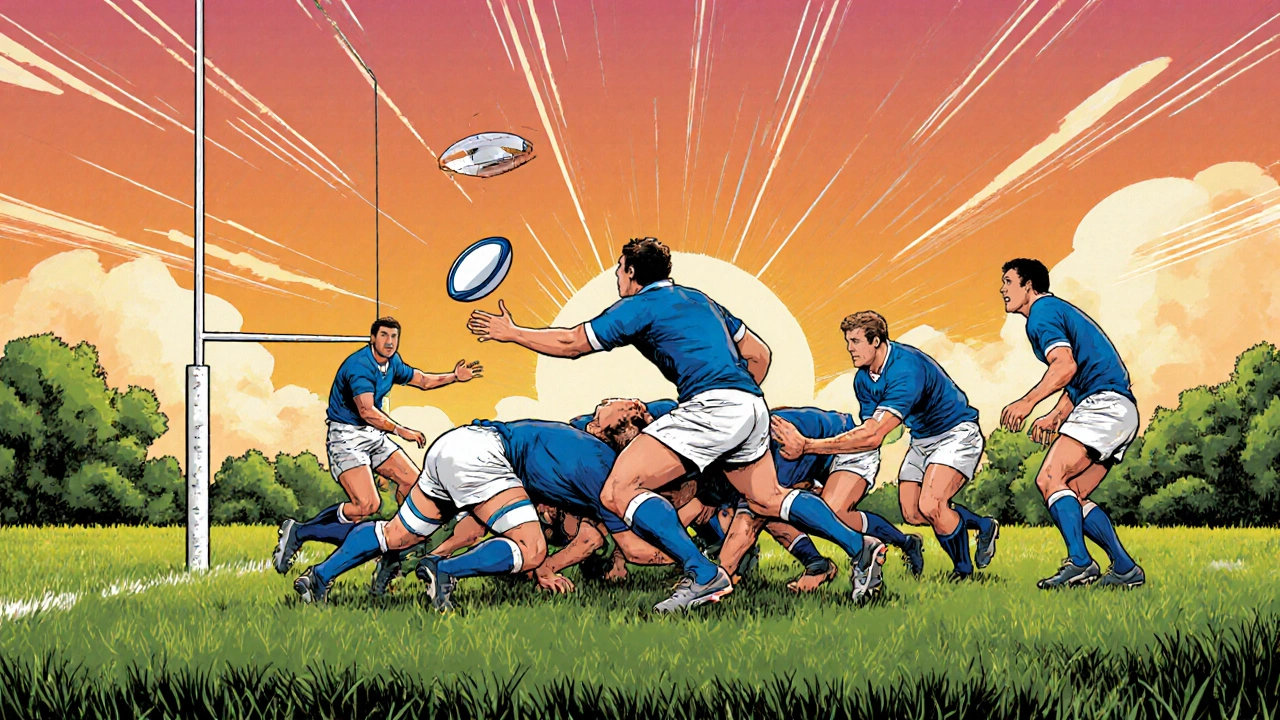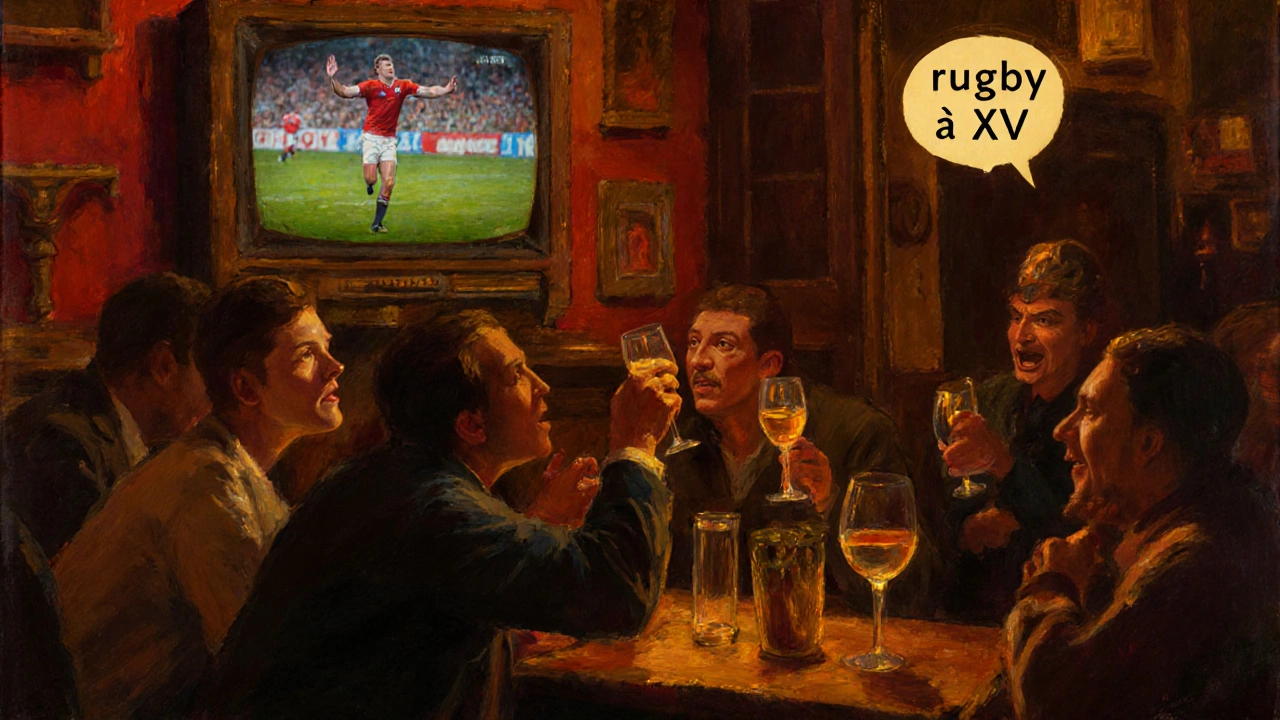
Rugby Fixtures October 14, 2025
What French Call Rugby - French Term for Rugby Explained
French Rugby Pronunciation Guide
Pronounce "Rugby" Like a French Fan
Practice the correct French pronunciation with this guide. Correct pronunciation helps you understand commentary and talk to fans.
Pro Tip: Avoid the English "rug‑bee" sound. The French pronunciation is shorter and smoother.
Why This Matters
Correct pronunciation helps you:
- Understand French commentary on TV broadcasts
- Sound like a native when discussing rugby with fans
- Recognize terms like "rugby à XV" and "rugby à XIII" in news reports
Quick Summary
- The French call the sport "rugby" - the spelling is the same but the pronunciation differs.
- When they need to specify the code, they use "rugby à XV" (union) or "rugby à XIII" (league).
- Key match‑day vocabulary includes ballon ovale, essai and touche.
- Pronouncing French rugby correctly helps you follow French commentary and chat with fans.
- Common mistakes are treating "rugby" as an English loanword and mixing up the codes.
How French Speakers Say "Rugby"
In French, the word rugby refers to the same sport known internationally; the term is borrowed directly from English but pronounced with a French accent. You’ll hear it in TV broadcasts, newspapers and everyday conversation across France, Belgium and Swiss Romandy.
The pronunciation is roughly /ʁy.bj/. The initial "r" is the guttural French R, the "u" sounds like the "u" in "rue", and the final "y" is a quick "ee" glide. If you say it with an English "r" or a hard "i" at the end, French ears will immediately notice the slip.
When the Code Matters: "Rugby à XV" vs "Rugby à XIII"
French rugby splits into two codes, just like English‑speaking countries. To avoid confusion they add a number that indicates the number of players per side:
- Rugby à XV (rugby union) - the 15‑player version, most popular worldwide.
- Rugby à XIII (rugby league) - the 13‑player version, especially strong in the south of France.
Match reports often just write "XV" or "XIII" after the word rugby. For example, "Le match de French term for rugby à XV ce soir" means “Tonight’s rugby union match”.

Essential French Rugby Vocabulary
Knowing a few key terms lets you follow a French commentary without constantly glancing at a glossary. Below are the most common words, each introduced with proper microdata markup.
- Ballon ovale the oval‑shaped ball used in both codes.
- Essai a try, worth five points in union and four in league.
- Transformation the conversion kick after a try.
- Touche a line‑out when the ball goes out of bounds.
- Mêlée the scrum, a contested restart involving forwards.
- En‑avant a forward pass, which results in a penalty.
- Union française de rugby the French Rugby Federation, governing body for rugby union.
Comparison: Rugby Union (XV) vs Rugby League (XIII) in France
| Aspect | Rugby à XV (Union) | Rugby à XIII (League) |
|---|---|---|
| Number of players | 15 per side | 13 per side |
| Scrums | Contested, frequent | Rare, largely uncontested |
| Tackle rule | Any player can contest the ball after a tackle | Play‑the‑ball restart after each tackle |
| Scoring values | Try5, conversion2, penalty3, drop goal3 | Try4, conversion2, penalty2, drop goal1 |
| Geographic popularity | Nationwide, strong in Paris and the north | Concentrated in the south‑west (Toulouse, Perpignan) |
Pronunciation Tips & Common Mistakes
- Start with the French guttural “R”. Place the back of your tongue near the throat and let air flow.
- Combine the “u” (close‑rounded) with a gentle “y” glide. Think of “rue” plus a quick “ee”.
- Don’t pronounce the final “y” as a full English “y” (as in “sky”). It’s softer, almost like the “i” in “ski”.
- Avoid saying “rug‑bee” - the English diphthong will sound out of place on French TV.
- When you add “à XV” or “à XIII”, keep the “à” short (like “ah”) and let the Roman numerals flow naturally.
Practice by listening to a French match on FranceTV or the official Six Nations feed. Pause, repeat, and compare your version to the commentators’. Over time you’ll sound like a native fan.

Using the French Term in Everyday Conversation
If you’re at a bar in Marseille watching a live game, you might hear locals say:
"Ce soir, le rugby à XV joue contre l’Angleterre, ça va être serré!"
Translate: “Tonight the rugby union plays England, it’ll be close!” Notice they never add “sport” - “le rugby” alone already conveys the idea.
When you talk to a French friend about a favourite player, you can say:
- "J’adore le jeu de Antoine Dupont, c’est le meilleur demi‑de‑mêlée du rugby à XV."
Even the term “rugby” works in written French headlines: "Le Top 14, le championnat de rugby à XV, démarre ce week‑end".
Mini FAQ - All Your French Rugby Questions Answered
Frequently Asked Questions
Do the French use a completely different word for rugby?
No. The French use the same spelling, rugby, but with a distinct French pronunciation.
What does "rugby à XV" mean?
It designates rugby union, the 15‑player version of the sport, which is the most popular code in France.
How do I say "try" in French rugby commentary?
The word is essai. Commentators say, "Il marque un essai!" (He scores a try!).
Is there a French word for "line‑out"?
Yes, it’s called touche. The phrase "lancer la touche" means “throw the line‑out”.
What is the governing body for rugby in France?
It’s the Union française de rugby, often abbreviated UFR.
Next Steps for Fans and Learners
- Watch a French‑language match on YouTube or the official Six Nations site; focus on the commentators pronouncing "rugby".
- Practice the key vocabulary list until you can say "essai", "touche" and "mêlée" without hesitation.
- Join a local French rugby fan group on social media. Real‑time chatting helps cement pronunciation.
- If you travel to France during the Top 14 season, attend a live game and try ordering a drink while saying "Je veux un verre pendant le rugby".
Understanding that the French simply say rugby-with a French twist-opens the door to richer conversations, smoother travel experiences, and a deeper appreciation of the sport worldwide.




